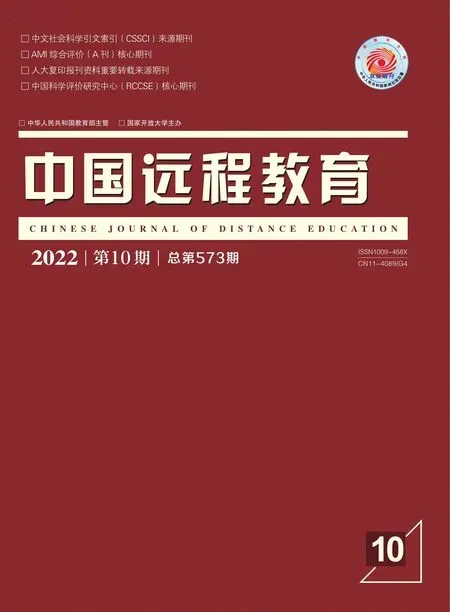Abstracts
2022-11-19
Reflections on the view of knowledge in the Age of Artificial Intelligence
Hua Du and Xiaoqing Gu
Emerging technologies have led to radical social reforms and also promoted the transition and evolution of education in the direction of smart education.With the emergence of smart machines utilizing artificial intelligence(AI)to conduct deep learning,knowledge medium and modality has been enriched,mode of production and dissemination reshaped,and life cycle accelerated and probably altered.Against this backdrop,humanity may no longer maintain a subject role in the realm of knowledge,a consequence which will radically transform the landscape of knowledge and bring about deep pedagogical reforms.Now is the best of times to discuss what counts as knowledge in the age of AI.This article expounds issues of knowledge in terms of connotation,mode of production,and representation.It is argued that knowledge is changing from ultimate truths to“fragments”of uncertainty,from hard knowledge to“soft”knowledge,and from“grey”knowledge to“dark”knowledge.Human-machine collective intelligence collaboration will replace humanity as knowledge producers.Knowledge will be represented in the form of smart machine computing representation rather than human cognitive representation.The article also discusses learning and teaching in the age of AI and measures for educators to cope with these changes.
Keywords:artificial intelligence;knowledge;concept of knowledge;medium of knowledge;production of knowledge;collective intelligence collaboration
How can teachers survive in the age of artificial intelligence?A critical reflection
Yuxi Tang and Weiguang He
In the age of artificial intelligence(AI),human teachers face issues such as the necessity of their existence,professional challenges,and directions of development.This article first examines what makes a teacher in terms of teacher-student interaction,teacher qualities and mission.The identity of a teacher is developed as a result of deep interaction between teacher and student,with professional integrity and ethics as core quality and abidance by code of ethics,dissemination of knowledge and promotion of positive values as lofty missions.It is argued that AI cannot replace human teachers in these senses.Despite this irreplaceability,human teachers are confronted with the alienation of smart education caused by techno-capitalism,the disruption of traditional education paradigm by Cyborgization,and multi crises brought about by super AI.The article also discusses how to break out of these dilemmas.
Keywords:artificial intelligence;teacher existence;professional ethics;professional quality;teacher-student interaction;smart education;alienation of education;technology ethics
Research trajectory of continuing education quality assurance in China:a visualization analysis of CNKI literature
Hong Zhao and Fei Jiang
Despite enormous development,continuing education is often criticized for its quality and not well reputed in China.Therefore,quality assurance of continuing education has always received attention from both researchers and practitioners.This study sets out to examine the research trajectory of continuing educationqualityassuranceinChina.Adoptingthemethodofscientificknowledgegraph,ituses CiteSpace to analyze keyword co-occurrence,emergence and clustering in CNKI-stored literature on this topic published between 1981 and 2020.Findings from the analysis show that research into the quality assurance of continuing education in China can be divided into four phases,with quality assurance system,elements of quality evaluation,quality standard,concept of quality,and Sino-foreign comparison as hot issues,although the foci of different phases may vary slightly.Research moved gradually from micro to macro perspective,put specifically,from researching the quality of a particular mode of learning and teaching to the construction of an overall quality system of continuing education,and from focusing on teaching quality to quality management and the construction and implementation of quality assurance system.Directions of future research are also discussed.
Keywords:lifelong learning system;learning society;quality education;continuing education;quality assurance;development trajectory;literature review;scientific knowledge graph
Intergenerational learning:towards a framework of theoretical analysis
Zhongming Ouyang and Zihe Wang
Given the potential value of intergenerational learning for older adult learning,it is imperative to extend and strengthen the explanatory and guiding power of intergenerational learning theory.This study uses content analysis to explore a framework of theoretical analysis for intergeneratonal learning.Intergenerational learning has experienced the transition from the first to second biological generation and from the biological to social generation.In terms of theoretical foundation,intergenerational learning is underpinned by psychology and rooted in pedagogy with beneficial outcomes from the perspective of sociology.Intergenerational learning can facilitate cognitive change,knowledge sharing and emotional connection.Drawing upon practice in China and other countries,this article outlines the four phases of an intergenerational learning model and main tasks of each phase.
Keywords:intergenerational learning; biological generation; social generation; intergenerational learning model; intergenerational interaction; knowledge sharing; education for the elderly; lifelong learning
A study of middle school students’behavioural characteristics and learning outcomes in online after-school services
Liujie Xu,Ling Chen and Shengquan Yu
Provision of diverse and quality after-school services may contribute to educational equity and help reduce parental burdens.Beijing launched an initiative whereby middle school teachers offered open online after-school tutoring to students in economically less developed areas with the aim of diversifying learning activities and enhancing learning achievements.This study set out to investigate students’behavioural characteristics and learning outcomes,using the methods of bahavioural dynamics and regression analysis to analyze after-school tutoring data and learning outcomes from 7,999 students.Findings show that the number of online tutorial,length of tutorial and interval between tutorials are characterized by power law with heavy-tailed effects.Participation is uneven.Furthermore,participants’progress is significantly greater than that of non-participants,with the number of tutorials as a significant predictor of increase in learning achievement.Implications of the findings for practice are discussed.
Keywords:after-school service;online tutorial;one-on-one tutorial;bahaviour analysis;learning achievement;bahavioural dynamics;online learning;after-school learning support
